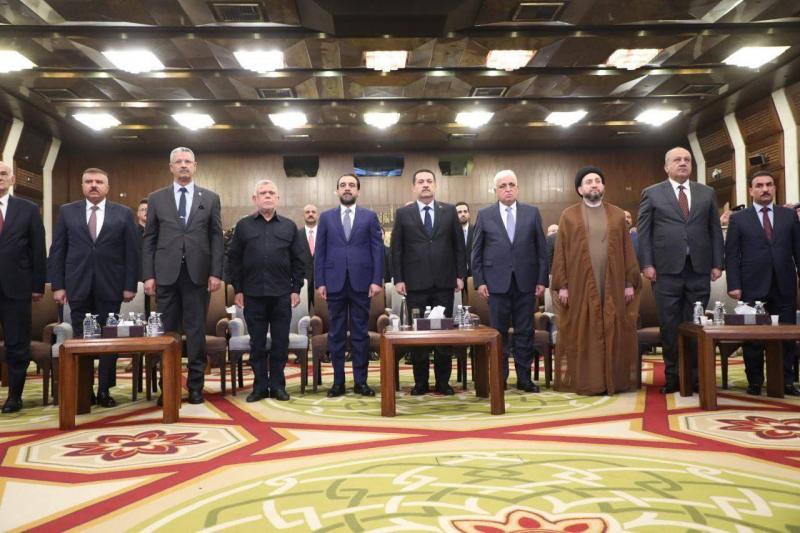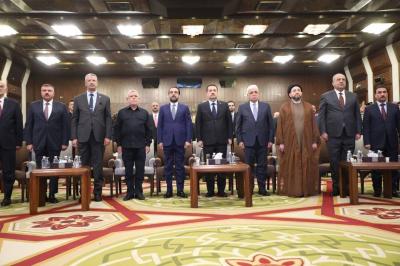The efforts made by Iraqi Prime Minister Mohammad Shia al-Sudani to regulate the rules of engagement between the United States and the armed Iraqi factions, which continue to attack the bases and facilities housing U.S. military personnel in both Iraq and Syria, have not succeeded. While al-Sudani seeks to make the new year (2024) a "year of achievements," as he promised the Iraqis amid financial abundance through a three-year budget he successfully passed in Parliament - a first in Iraq - the challenges arising from the ramifications of the "Gaza War" and the reactions of several Iranian-aligned factions are casting a shadow over the Iraqi interior, amidst a political and societal division on how to deal with the situation.
Al-Sudani had previously set a challenge for the armed factions that targeted the U.S. embassy in Baghdad last month. He described their actions as "terrorist acts." This description pleased Washington and did not encounter resistance domestically, including from the "Coordination Framework" Shiite forces, which some consider aligned with Tehran. However, ultimately, it did not prevent these factions from continuing their attacks on the bases where U.S. forces are stationed under the guise of "advisors," as the Iraqi government claims, particularly at the Ain al-Asad base in Anbar province and the Harir base in Erbil. Moreover, the government has been unable to arrest the individuals who consistently announce that they will be brought to justice, according to official statements.
The only commitment these factions have maintained is to avoid launching additional attacks on the U.S. embassy compound, indicating, according to statements from some faction leaders, that they would respect the state's perspective on protecting foreign diplomatic missions, including the U.S. embassy. However, the shelling of U.S. sites and facilities, which resulted in injuries among American military personnel within sites targeted by these factions near the Iraqi-Syrian border, led to an unexpected U.S. response. This response involved targeting a Popular Mobilization Forces (PMF) headquarters, resulting in Iraqi fatalities and injuries.
It is noteworthy that the Iraqi Prime Minister, according to Al-Sharq Al-Awsat, had obtained the approval of the "Coordination Framework" forces regarding how to deal with elements sometimes referred to as "lawbreakers" or sometimes as "terrorists." However, the latter term is being used for the first time for factions that have clear titles and consider themselves "resistance factions," reflecting the nature of division within the "Coordination Framework," which is currently in power, as al-Sudani belongs to it.
In this context, al-Sudani's vision for managing internal state affairs and his approach to foreign issues have begun to differ from what some leaders of the "Coordination Framework" see. However, the U.S. forces' strike on a PMF headquarters in the Jurf al-Sakhar area south of Baghdad was the "variable" that disrupted the balance of relations between Baghdad and Washington. It is worth noting that Washington had expressed satisfaction with al-Sudani's steps regarding the attack on the U.S. embassy by armed factions, including his description of the incident as a "terrorist act."
Furthermore, while the Iraqi government condemned the Jurf al-Sakhar attack, the condemnation did not reach the level of presenting a formal protest, as commented by Iraqi parties opposed to the U.S. presence in Iraq. The "diplomatic language" used in the statement suggests that the government appears to be "walking a tightrope" between Washington on one hand and armed factions on the other, especially amid the Iraqi government's constant assertion of its need for the U.S.-led international coalition, as well as its adherence to the "Strategic Framework Agreement" signed between Baghdad and Washington in 2009. In fact, the government statement reads: "We strongly condemn the attack targeting the Jurf al-Sakhar area, which occurred without the knowledge of the Iraqi government entities; this constitutes a clear violation of sovereignty and an attempt to disrupt the stable internal security situation. The Iraqi government is exclusively responsible for enforcing the law and holding violators accountable."
"Messages of Protest and Reassurance"
This implies that the attack was carried out without Iraqi government knowledge and seemingly served, on one hand, as a "message of protest" directed at Washington for its hesitance to coordinate with Baghdad, despite the obligations set out in the Strategic Framework Agreement. On the other hand, it seemed to be a "message of reassurance" to the armed factions that the government had not given Washington the "green light" in any manner, viewing it as a violation of sovereignty.
Moreover, the government statement reiterated support for the international coalition, stating that "the presence of the international coalition in Iraq supports our armed forces through training and advice, and what occurred is a clear violation of the mission that the coalition forces are in Iraq to combat ISIS; therefore, they are called upon to refrain from acting unilaterally and to respect Iraq’s sovereignty without compromise regarding any breaches."
Nonetheless, Prime Minister Mohammad Shia al-Sudani firmly addressed the ambiguous relationship between the state and the armed factions that have persistently targeted U.S. interests in Iraq over the years. These factions, most of which have alliances with Iran, have concentrated their attacks on bases housing U.S. military presence, such as Ain al-Asad and Harir bases, alongside the U.S. embassy, driven by rejection of the presence of U.S. forces in Iraq. However, these attacks have intensified over the past years and escalated during the tenure of former Prime Minister Mustafa al-Kadhimi, with no group taking responsibility for them.
"Airport Operation"
Additionally, the Iraqi government at that time did not dare to identify these factions or use descriptions that transcend the term "lawbreakers" in its condemnation statements. Typically, it would only state its success in finding rocket launch pads. While al-Kadhimi was announcing an agreement with the Americans on a schedule for their withdrawal from Iraq, claiming that no more than about 2,000 advisors would remain based on the "Strategic Framework Agreement" - which Iraq signed with the U.S. in 2009 during Nouri al-Maliki’s government - factions attacked al-Kadhimi vehemently. Some accused him of facilitating the "airport operation," which occurred on January 3, 2020, while he was serving as head of the intelligence service in the interim government of Adil Abd al-Mahdi. As is known, this operation involved a U.S. warplane strike near Baghdad International Airport, leading to the deaths of Qassem Soleimani, commander of the Quds Force in the Iranian Revolutionary Guard, and Abu Mahdi al-Muhandis, deputy chairman of the Iraqi PMF, which subsequently led to unprecedented escalation in both attacks and political stances. Indeed, within three days of the operation, the Iraqi Parliament issued a non-binding resolution calling for the expulsion of Americans from Iraq. However, this resolution became a scape goat for political forces opposing the U.S. presence to hang all their disputes with the government led by Mustafa al-Kadhimi since the fifth month of 2020.
While attacks increased, complicating the relationship with al-Kadhimi to the point that some factions launched an attack on his home with the intent to assassinate him, the subsequent repercussions exacerbated the complications of the situation following the results of the elections held at the end of 2021, which led to the ousting and pursuit of al-Kadhimi and his team and the coming of a government formed by the Shiite "Coordination Framework" forces that nominated al-Sudani for its leadership.
No Neutrality with the State
On another note, following the outbreak of the Gaza War on October 7, 2023, Iraqi factions calling themselves the "Islamic Resistance in Iraq" — including the al-Nujaba Movement and the Iraqi Hezbollah Brigades — announced their decision to target U.S. sites and objectives in both Iraq and Syria, on the grounds that Washington fully supports Israel in its war against Gaza and Hamas. They also declared clearly that they are part of the "unity of arenas" against Israel.
Within Iraq, among the main forces that formed the current government, namely the Shiite "Coordination Framework," it has become awkward due to the fact that some elements of the "Coordination Framework" are part of the government, while some have parliamentary representation, even though they consider themselves part of the "resistance axis." With the factions that have begun targeting U.S. forces in Iraq or the U.S. embassy revealing their explicit names, it became evident that other forces within the "Coordination Framework," which leads the government, while simultaneously viewing themselves as part of the resistance, began to feel uneasy about how to reconcile between these conflicting paths. The Iraqi government, through its Prime Minister, has declared a clear official stance regarding the Gaza War, which is considered by the political forces supporting the Prime Minister as a strong stance. As the government continues to uphold this position, the targeting of U.S. interests by the armed factions - explicitly named - poses a dilemma for the government itself and its supporters from within the "Coordination Framework," especially in terms of balancing the necessity of respecting state sovereignty with the emotional aspect arising from the war on Gaza and the contexts of support it imposes.
In an attempt by the Prime Minister to reach a settlement with the armed factions through powers that classify themselves as “resistance” yet are part of the government to reduce the targeting of Iraqi bases hosting coalition forces, the ongoing strikes have led to rising official rejection of the targeting operations. However, this rejection has not reached a level that would entail severe political positions. Nevertheless, the targeting of the U.S. embassy in the heart of Baghdad was "the straw that broke the camel's back" in the relationship between the government and these factions.
In what is considered the strongest official statement regarding the description, Mohammad Shia al-Sudani referred to the actions of the factions targeting the U.S. embassy as a "terrorist act." However, this description, while leading to further embarrassing positions within these factions, was accepted by the Americans, who seemed to have been awaiting such a step, especially since they were being criticized in Iraq for categorizing some of these factions as “terrorists.” Thus, this designation, particularly as it came from the military spokesperson for the Commander-in-Chief of the armed forces, holds deep significance.
Al-Sudani did not stop there; he obtained the approval of the “Coordination Framework” forces, with whom he met on the night of the incident, to announce their support for him in the context of protecting foreign missions in the country. In terms of this designation, it seems that the rules of engagement have changed between the armed factions and Washington, which the Prime Minister sought to regulate as much as possible. Although the relationship remained normal between al-Sudani and the armed factions, as they are close to the government - leading to a long ceasefire lasting nearly a year - the intensification of military operations in the context of the Gaza War and the increasing targeting of U.S. interests in Iraq concluded the ceasefire between the two sides.




